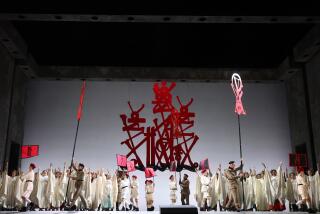BACQUIER AS FAT KNIGHT : GOETZ FRIEDRICH’S VIEW OF VERDI’S ‘FALSTAFF’ ON TV
- Share via
Goetz Friedrich, the controversial director of the Deutsche Oper Berlin, staged “Falstaff” for German television in 1979. America finally catches up with his celebrated--and only slightly provocative--production of Verdi’s autumnal masterpiece this weekend, thanks to PBS and the Great Performances series.
KCET Channel 28 does the honors tonight at 9 with a simulcast on KUSC. Channel 24 begins earlier, at 8, with a simulcast on KVCR. Channel 50 follows Saturday at 8 p.m.
Friedrich is best known, perhaps, for finding unorthodox solutions to orthodox operatic problems. Although an honored alumnus of the Felsenstein school of realism, he often stresses unexpected psychological, sociological and/or political subtexts when it comes to retelling familiar tales.
Not so with “Falstaff.”
One can argue that the milieu chosen here by Friedrich suggests picture-book Weimar as much as 15th-Century Windsor. One can accuse the director of stirring the sometimes frantic action with a rather heavy Germanic hand. One can note a few innocent innovations: The comely Mistress Ford, for instance, does some of her not-so-merry scheming while relaxing in a bubble bath. (Strangely, the same operatic character did the same damp thing in a television version of the Nicolai alternative some years ago.)
Essentially, however, Friedrich has been content to play the comedy straight. And fast.
With the aid of his appreciative designers (Joerg Neumann and Bernd Mueller), he has created a lusty, dusty, rustic Windsor in which all the world looks like anything but a stage. Although he likes his laughs, he has not overlooked the serious--even tragic--undertones that elevate both the music and libretto. In this day of popular gags and dizzy distortions, one must be grateful.
His Falstaff--superbly delineated and poignantly vocalized by Gabriel Bacquier--has a most ingratiating sense of humor. Still, that does not make him a clown. If one looks close one can see pain in Bacquier’s eyes, wisdom in his smile, power--when he needs it--in his gait.
This fat knight is fat enough to look foolish, especially when he is made to go a-wooing in a reddish toupee and a costume that caricatures courtliness. He also remains enough of a knight to exude confidence, charm, dignity, righteous rage, even a certain fading sex appeal.
No wonder Mistress Ford harbors some doubts about her duplicity. No wonder her husband feels threatened, to a degree, even when he thinks he has the upper hand.
Karan Armstrong is the exceptionally vivacious, surprisingly sensitive Mistress Ford. Richard Stilwell is the intelligent, vocally lightweight Ford.
The others are competent if less interesting. Marta Szirmay makes a thin-toned schoolmarm of Quickly. Jutta-Renate Ihloff introduces bleached-blond good looks and bleached-blond sounds as a Nannetta who looks no younger than her mother. Max-Rene Cosotti delivers a bland Fenton, Silvia Lindenstrand a simply pretty Meg.
Everyone acts with sly, fleet-footed gusto, but not everyone’s lips move in effective synchronization with the prerecorded sound track. The sound track, not incidentally, is robust, propulsive, sometimes downright rowdy performance in which none less than Sir Georg Solti conducts forces of the Vienna State Opera.
More to Read
The biggest entertainment stories
Get our big stories about Hollywood, film, television, music, arts, culture and more right in your inbox as soon as they publish.
You may occasionally receive promotional content from the Los Angeles Times.










